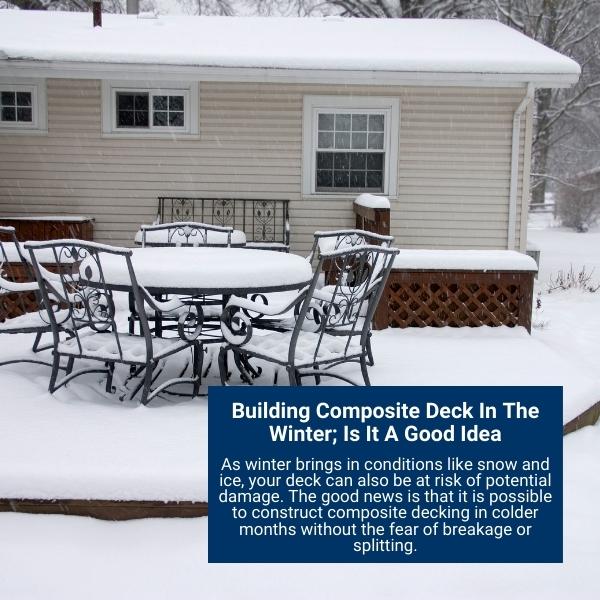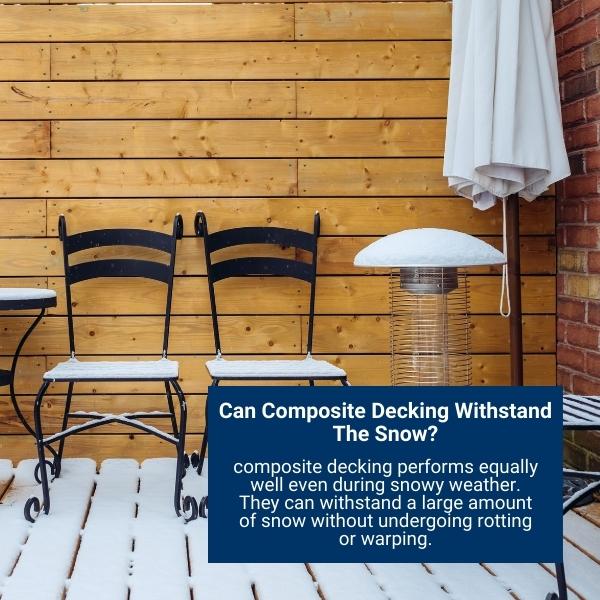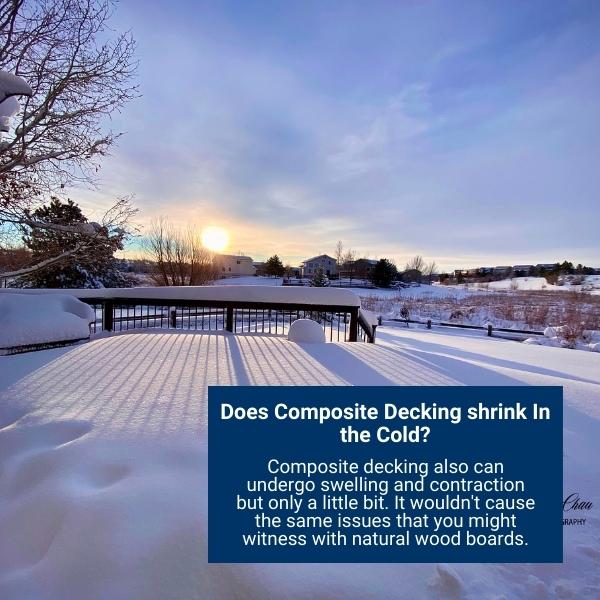Contrary to popular belief, winter is the best time to build a deck in your backyard. The process will be complete just in time, and you can enjoy your new deck in spring.
But, to be on the safer side, it is always wise to know which type of deck material will survive the cold months better. You might want to investigate if you can install composite decking in the winter?
You can install composite decking in any season, including winter. They can cope with the low temperatures without losing their properties. Composites decks are winter-proof and can also withstand heavy snowfalls. They do not warp or split and remain intact during frosty weather.
Severe winter may sometimes delay the building process of your deck, but this is not true in the case of composite decks. This article highlights the benefits of installing one for yourself, especially if you live in a colder climate.
Building Composite Deck In The Winter; Is It A Good Idea
For the most fraction of the year, Your deck is the ideal place for spending some quality time outdoors. It is winter when the real problem starts to knock in, and you may not be able to use the deck during this timeframe. In regions prone to low temperatures and frequent snowfalls, the deck can become completely unusable.

As winter brings in conditions like snow and ice, your deck can also be at risk of potential damage. The good news is that it is possible to construct composite decking in colder months without the fear of breakage or splitting. It is more durable and easy to maintain than a traditional limber requiring constant care and upkeep.
Also Read: Deck VS Pavers: Differences, Costs, Pros and Cons
The composite deck works the best in areas that experience extreme weather outbursts. They are highly resistant to moisture, thermal changes, heavy winds, and freeze damage. Wood decks, on the contrary, can suffer significantly in harsh winter.
Why Should You Choose Composite Decking For Winter?
While typical softwood and hardwood cannot survive well in the cold, it is where composite decking takes the lead. It gets constructed from a combination of natural hardwood and composite material. The resultant is a high-quality product, perfect for the outdoor environment. Adding to it, composite deck boards offer super resistance to moisture and freezing temperatures.
Also Read: Can You Build a Deck Over a Septic Tank? Step by Step Guide
Thus, there is a very low to no chance of warp or split due to continuous exposure to cold. Also, they do not require treatments or sealing to maintain their winter-proof properties. These elements make the composite deck sturdy and more durable than wood or plastic throughout all seasons. It is the perfect deck choice for you if you are searching for one that provides longevity and minimal upkeep or repair after the harsh cold months.
Can Composite Decking Withstand The Snow?
As some regions of the world experience frequent snowfalls in the wintertime, it can be challenging to look after the maintenance of your deck. However, composite decking performs equally well even during snowy weather. They can withstand a large amount of snow without undergoing rotting or warping.

Composite decks, without a doubt, are highly durable, but it doesn’t mean you should leave them covered with snow. Besides, it is easy to keep them clear of the snow buildup. When you take proper care of your deck in the off-season, it will be all set and ready for you to use in the coming months.
Also Read: What to Put Under the Deck for Moisture? 6 Different Options
Will Composite Decking Turn Slippery In Winter?
One of the most common problems with winter is the after-effects of heavy snowfall. When you do not remove the snow on time, it can turn into ice and make the deck surface slippery. It becomes unsafe for you and your family to walk on the ice, and there is a risk of slipping and falling.
Unlike other decking materials, composite decks cannot turn slippery at once if ice accumulates on their surface. However, they are not entirely slip-proof. You need to maintain your composite decking to make it less slippery during the winter. Thus, regular cleaning can help minimize the slipperiness of the surface so you can easily walk on it.
Does Composite Decking Shrink In The Cold?
Most of the decking material tends to expand and contract under varying temperatures. Composite decking also can undergo swelling and contraction but only a little bit. It wouldn’t cause the same issues that you might witness with natural wood boards.

Composite decks do not require staining or sealing to keep the water out. They are designed to withstand the changing weather conditions much better than traditional wood. They will not contract to the same extent as others if fitted correctly. Nevertheless, there should be enough room between the deck boards to allow the small amount of contraction that can take place during cold days.
Caring For Composite Decking In Winter:
While composite decking is incredibly durable, it still requires care to keep them in a good state for many upcoming years. To achieve this goal, take out some time to clear away fallen leaves, dirt, and other debris before the arrival of snowfall. It will prevent the deck surface from unwanted stains.
Also Read: Can You Install Trex Decking In The Winter
After the snowfall ends, ensure to remove all the snow and ice accumulation on the deck surface. Gently use a plastic shovel or a broom to sweep away the white buildup. Be careful not to scratch the surface and cause irreparable damage. You can also opt for calcium chloride-based ‘ice melts’ or rock salt.
Although a composite deck demands minimal upkeep efforts, a well-maintained deck can add significant value to your property and increase its lifespan.
Final Thoughts:
Composite decks hold up pretty well in winter and are one of the most durable cold weather deck materials. Since it gets constructed from wood and plastic fibers, it performs better in winter than natural wood decking. Besides, they are maintenance-free and easily survive snowfalls and low temperatures without rotting and warping. You might require to give it an occasional cleanup to preserve its winter-proof qualities.
Also Read: Can You Build a Deck Over an AC Unit? – Step by Step Guide

